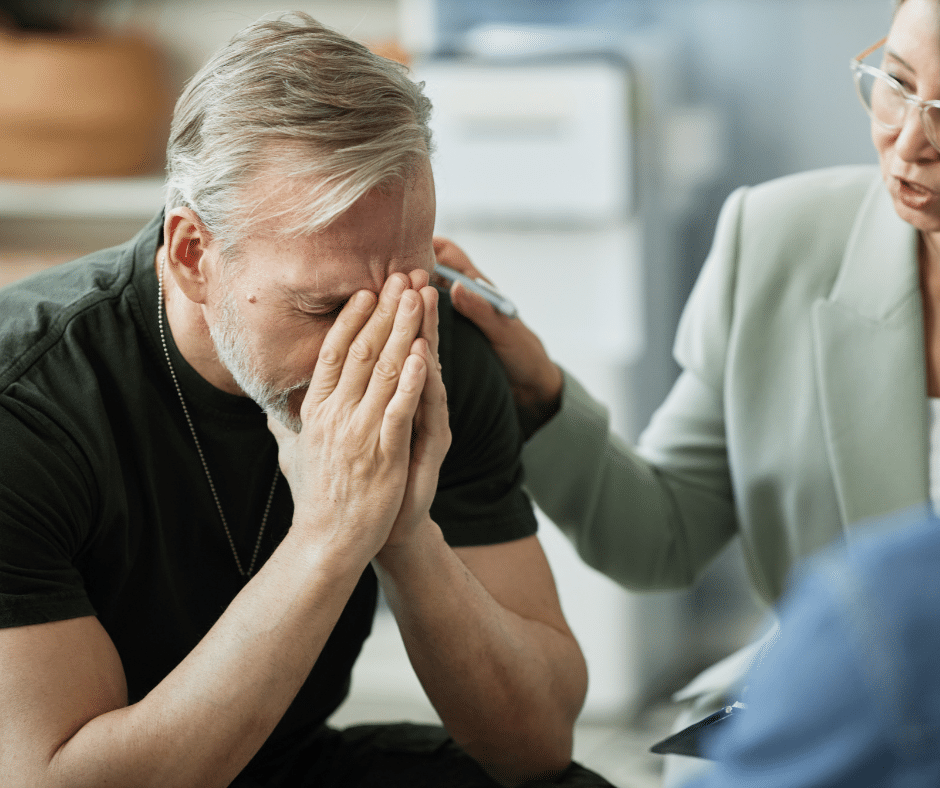Anxiety Disorder Treatment in Atlanta
Anxiety Disorder Treatment in Atlanta: Find Peace and Confidence
Living with anxiety can feel overwhelming, but you don’t have to face it alone. At Ridge Way Mental Health Services in Atlanta, we provide compassionate and personalized care to help you reduce anxiety symptoms, regain control, and live a more peaceful, confident life. Our experienced clinicians are here to guide you every step of the way.
Take the first step today—schedule your consultation and begin your journey toward lasting relief and emotional well-being.

Understanding Anxiety Disorders
Anxiety disorders go beyond occasional stress—they are persistent conditions that can disrupt your daily life, relationships, and overall happiness. Millions of people experience anxiety, but the good news is that effective treatment is available.
At Ridge Way Mental Health near Atlanta, we specialize in treating various anxiety disorders, including Generalized Anxiety Disorder (GAD), OCD, Panic Disorders, PTSD and Specific Phobias.
Discover Clarity:
Comprehensive Anxiety Evaluation in
Atlanta
Your journey begins with a comprehensive anxiety evaluation, where we assess your symptoms, personal history, and treatment goals. This critical step helps us understand the root causes of your anxiety and develop a personalized plan tailored to your needs.
Based on your evaluation, we create a treatment plan that may include therapy, medication, or holistic strategies to effectively manage your anxiety and improve your overall well-being.
We Offer Comprehensive Anxiety
Treatment for Children, Teens, and Adults Atlanta
Teen Anxiety Treatment in
Atlanta
Our teen anxiety treatment addresses academic stress, social challenges, and emotional struggles, providing tools to build confidence, reduce anxiety, and thrive.
Adult Anxiety Treatment in
Atlanta
Our adult anxiety treatment reduces chronic worry and panic attacks through personalized therapy, empowering adults to regain control and find calm.
Child Anxiety Treatment in
Atlanta
Our children’s anxiety treatment uses play therapy and relaxation techniques to help kids express emotions, overcome fears, and build resilience.
Compassionate
Support for Anxiety Recovery in Atlanta
Recovery from anxiety is a journey, and we’re here to support you every step of the way. Following your personalized evaluation and treatment plan, we provide ongoing care to monitor your progress, adjust your plan as needed, and ensure the best possible outcomes.
With our compassionate approach, we help you build the confidence and skills needed to manage anxiety effectively, bringing you closer to a life of calm and emotional well-being.
We Are Now Accepting New Patients
For Anxiety Disorders Treatment in
Atlanta
Is Anxiety Treatment Right for You?
If anxiety is interfering with your ability to enjoy life, connect with others, or perform daily tasks, professional treatment can help. You don’t have to feel stuck, alone, or overwhelmed. Seeking help is a courageous step toward a brighter, calmer future.
Our team of compassionate clinicians is here to guide you with empathy and expertise, helping you develop skills to manage anxiety and reclaim peace of mind.
Why Choose Ridge Way Mental Health for Anxiety Treatment in Atlanta?
When you choose Ridge Way Mental Health in Atlanta, you’re choosing compassionate, expert care designed with your well-being in mind. Our licensed clinicians create personalized treatment plans tailored to your unique needs, using proven therapies like CBT and mindfulness to deliver real results.
In a supportive, judgment-free environment, we’re here to listen, understand, and guide you every step of the way. Conveniently located near Atlanta, we’re ready to help you overcome anxiety, find calm, and reclaim the life you truly deserve.
Hear Our Patients' Success Stories
Bipolar Disorder Patients

Discover Alex’s path to stability with Ridge Way’s custom care.
OCD Patients

Discover how Emma beat OCD with our custom therapy.
Anxiety Patients

Discover how Sarah beat anxiety with our support.
Gender Dysphoria Patients

Discover how Jordan embraces identity with our support.
Take Action Today:
Find Relief from Anxiety in Atlanta
Anxiety doesn’t have to control your life. At Ridge Way Mental Health near Atlanta, we’re here to help you find lasting relief, confidence, and calm. Schedule your consultation today and begin your journey to a brighter, anxiety-free future.
Atlanta Anxiety Treatment: FAQs
What happens during an anxiety evaluation in Atlanta?
During your evaluation, we discuss your symptoms, medical history, and personal goals. This helps us create a personalized treatment plan tailored to your unique needs and challenges, setting the foundation for effective care.
What anxiety treatment options are available in Atlanta?
We offer evidence-based treatments, including:
- Cognitive Behavioral Therapy (CBT): To address negative thought patterns.
- Mindfulness Techniques: To help you reduce stress and focus on the present.
- Exposure Therapy: For overcoming specific fears in a controlled environment.
- Medication Management: When appropriate, medications can help alleviate symptoms.
How long does it take to see results from anxiety treatment in Atlanta?
While timelines vary, many patients begin noticing improvements within 4–6 weeks of consistent therapy or medication. We work closely with you to ensure progress is monitored and adjustments are made as needed.
Is teletherapy available for anxiety treatment in Atlanta?
Yes, Ridge Way Mental Health offers teletherapy for patients seeking flexible, at-home care. Teletherapy provides the same high-quality support as in-person sessions.
Where can I find trusted anxiety treatment near Atlanta?
Ridge Way Mental Health near Atlanta offers compassionate, expert care for a wide range of anxiety disorders. Our team is dedicated to helping you manage symptoms and regain peace of mind.
Expert Care Across the Nation
No matter where you are in Atlanta, Ridge Way Mental Health Services is here. With both in-person and telehealth services across the country, we make sure you can always find the help you need at the right time.


